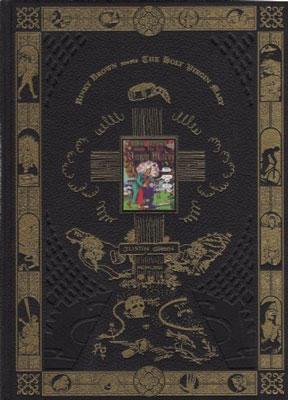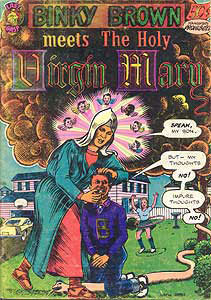The Trials of Binky Brown
By Beth Davies-Stofka
July 1, 2010 - 08:37
McSweeney's
Writer(s): Justin Green
ISBN: 978-1934781555
$29.00 US
It would be a gross understatement to say that I was looking forward to McSweeney's reissue of Justin Green's landmark 1972 comic Binky Brown meets The Holy Virgin Mary. Binky Brown, the first autobiographical comic, has not been seen in its full-sized, raw, exposed, and original glory in over 30 years.
 |
Binky is a young Catholic boy growing up in the American suburbs of the late 1950s. He is consumed by sexual neuroses. As a small child in Catholic school, the nuns, a.k.a. "fascist penguins," train the children to repeat the catechism and submit to the infallibility of the church. Little children drawn as marionettes line up on a stage to recite, "To gain the happiness of heaven we must know, love, and serve God in this world. And even though God knows whether we will go to heaven or hell when we die, we still have the free will to do good or evil." Green comments, "Believe it or burn! (Or maybe, "believe it" and still burn!)"
Young Binky takes the Church's teachings to heart, and begins obsessing on sin and penance. When he reaches puberty, this obsession takes a turn into unimaginable darkness. The boy's first encounters with uncontrollable erections occur while he's praying the rosary at home, or while he's in church, or worst or all, while he's praying the rosary in church. He becomes convinced that he is committing mortal sin upon mortal sin. He can't stay in the church to pray, not with all those erections, and he can't appeal for help to the Virgin Mary, because she is pure. He is reduced to asking God, "Please don't hurt me or my mom." He struggles to keep up with his increasing need for penitential prayer, a sentence he lays on himself in his frantic struggle to keep his family safe from the fires of hell.
 |
God doesn't kill Binky, of course, and so finally Binky runs away from the Church, renouncing Catholicism. Why not? He knows he's damned for eternity. At least, by leaving the Church, he can stop worrying about his constant sinning.
Binky grows up, still emitting his "pecker-rays," and still muttering incantations in an effort to control these destructive manifestations of sexual desire. He no longer mutters Catholic incantations. He now relies on incantations of his own devising. But the root problem remains the same. "Our Lady" still "looms over him," a supernatural reality somewhere out there, his ultimate destiny still the eternal flames.
Until one day, one wonderful day, when Binky has a revelation that puts him on the road to freedom. I'm not going to spoil the end for you. I'd like to allow you to read it, and find out exactly what happened on that frabjous day, the day that Binky "lay the devil down." Let's just say that Binky's final and cathartic ritual of liberation thunders across the panels with a smash and a crash, leaving him to peacefully pick up the pieces.
It was incredible to read this comic again as though for the first time. It has every bit of the same power as sacred text. It accomplishes the same goals as sacred text – it catapults the soul into new, rarefied, restored spiritual lands. By telling his story in such painfully honest detail, Green produces a method and means of salvation, a hermeneutic of emancipation from the mental slavery of oppressive religious indoctrination. The story of Binky Brown is the story of a man who found the power within to liberate his soul from evil and despair.
Sometime in the late 1980s, Green heard an interview on NPR with Dr. Judith Rapoport, author of The Boy Who Couldn't Stop Washing, the groundbreaking study on OCD. Suddenly, Green's – and Binky's – story took a sharp turn into completely new territory. Binky's sad torments took on a whole new sense and meaning, and Catholicism seemed less responsible for his suffering. But although we can now read Binky's story with sensitivity to the ordeals of those with OCD, Green's comic still has the power to help those struggling with the pain of religious indoctrination, and the sexual perversions of their leaders.
After all, communities and families around the world are reeling in shock and pain at the ongoing revelations concerning the monstrous sexual perversions of Catholic clergy in seemingly every corner of the world. Their cruelties hurt people. The pain they cause is real. While the cause of Green's struggles are now (rightfully) attributed to his undiagnosed obsessive compulsive disorder, we shouldn't allow that revelation to obscure the context of his suffering, created by a religion that apparently has been sickened for decades with sexual neurosis, and radically so.
Binky Brown is a pathfinder who reassures us that our own emancipation is possible, and that a soul at rest is in our sights. Would you like my prescription? Buy this book! Buy it for the extra large sheets. Tear it out of its binding. Tape the pages to your walls, or better, string a line across your largest room and clip the pages to it with clothespins (remember those?). Access its power. Conjure a vision of your own freedom. Conjure a door while you're at it, and don't forget to walk through. Live with this comic, while you gradually replace its pages with your own. Free yourself from evil and despair, and restore yourself to a better, happier spirituality.
And if you have a minute, let us know how you did it.
Rating: 10/10
Related Articles:
The Trials of Binky Brown
Binky Brown meets The Holy Virgin Mary
